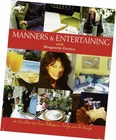Good manners at a low
Published: Sunday | March 8, 2009

Chester Francis-Jackson, Contributor
From the late '70s, into the '80s and even into the early '90s, Kingston and St Andrew was blessed with a number of etiquette and grooming experts who saw to the social and professional grooming of the young and/or budding entrepreneur. Social hopefuls recognising their own shortcomings, sought the requisite professional help to build their social skills in the professional spheres.
In this respect, one recalls such grooming and etiquette experts and/or consultants as Marguerite Kirkpatrick, of MK Careers; Molly DaSilva - who offered courses in poise, grooming and elocution; Peter Fraser, and his partner, Brenda Belding, whose company, Tremaine Limited, offered grooming skills, particularly in the culinary field and saw them offering courses in dining etiquette and manners, the basics of entertaining, food preparation and presentation, as well as deportment.
Front-running models
Then there were Marsha Chin and Bev Corke, front-running models who shared their years and expertise by offering grooming and social graces courses; and Pulse, who apart from its modelling curriculum, taught grooming and social skills to young professionals, desirous of being ready for the world of business and/or the social swirl.
Sadly, today individuals offering these social skills are in the decline and many young professionals entering the corporate and social worlds are at a loss when it comes to coping in the corporate/social setting.
Consequently, many young professionals, having gained access to the corporate world and the potential for upward mobility, are sadly lacking in the social graces. They have embraced the coarseness of the sub-culture, and its underbelly in text and manner as a substitute for polite and acceptable behaviour.
Continuing ignorance
It is this state of continuing ignorance which accounts for the embrace of the vulgar by people who have mastered the art of social integration through manners, and etiquette, stepping in and unashamedly offering banal explanations for the uncouth and vulgar, instead of seeking to elevate through the process of (re)education. They themselves, acting as agents of the vile, wittingly, or unwittingly, as is the case with those who would now side with opposers of the actions of the Broadcasting Commission, that, however, belatedly, have stepped in to restore a semblance of order to a situation that was clearly running amok!
Sadly, those who would oppose the Broadcasting Commission's latest stance would have us replace mainstream culture, with the sub-culture. And therein is the short-sightedness and bankrupt postulation of their premise, as the moot is really quite simple: Should the sub-cultural be allowed to replace mainstream cultural norms and acceptable modes of behaviour? The answer is a resounding no.
The sub-cultural should not, and must not, be allowed to replace mainstream cultural practices in song, dance, speech, dress and even more importantly, manners!
The current debate about the suitability of the some music for airplay must be seen in context that this debate is now only taking place because the guardians have allowed the lines to be blurred to the point where the sub-culturel was seen by some as being mainstream. If we continue by omission to promote and embrace the former as the mainstream cultural identity of our people, as against relegating it to the fringe entertainment that it is, rich with possibilities for inspiring and influencing the main, then all is lost.
Old values
While some old values are worth revisiting and possibly re-evaluating, the basic tenets underpinning the very reasons and social guidance they provided over the years should not be undermined by new attitudes, as it is the new attitudes that have facilitated the decay and/or malaise that affects all facets of our national life.
This new attitude accounts for the rudeness and uncouth behaviour visited upon the public daily by those entrusted with the responsibility of being the guardians of public trust, decorum, and/or acceptable behaviour. It accounts for the uncouth behaviour customers who interface with public and private institutions in pursuit of legitimate business and/or social activities encounter and with seemingly no redress if they dare to complain.
It accounts for the reason(s) some motorists (police included) stop in the middle of our roadways to converse with friends without a care as to the effect their behaviour is having on other road-users. Or the pedestrians use busy thoroughfares as if lounging in the privacy of their homes. But more importantly, it accounts for the corrosive and corrupting effect this new attitude has on our institutions, people and country as a whole. So, join us here next week, when we will take a look at the basic rules and responsibilities of a good guest!
